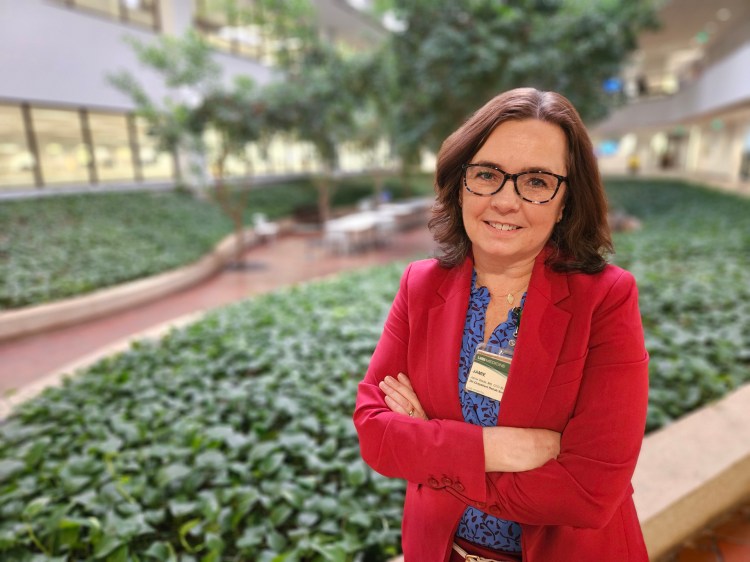Clin Sim partners with Outpatient Rehab for leadership simulation

When it comes time for simulation, Jamie Wade dives right in.
In collaboration with UAB Clinical Simulation, Wade, director of UAB Spain Rehabilitation Center’s Outpatient Rehabilitation Services and Community Partnerships, recently facilitated a series of pilot simulations focusing on rehabilitation leadership.
The first pilot took place in August 2024 and served as the capstone project for Wade’s Master of Science in Healthcare Simulation, followed by a second pilot that December. Not only did the sim help her graduate, it helped achieve a longtime professional goal—the impetus behind pursuing a master’s in health-care simulation in the first place.
“I wanted to develop simulations for leaders, because I didn’t see that being addressed anywhere,” Wade said. “Rehab is growing. We’re getting a new inpatient facility, our services are growing in the acute care and outpatient sides, and we’ve started hiring new leaders. So, I was just kind of pondering, ‘How do we better equip leaders to be leaders? How can I do a better job supporting them? I wish I could simulate what it’s like to counsel an employee for the first time.’”
Her wish came true. By consulting with various stakeholders, including colleagues, managers and leadership from Spain Rehab, Wade identified a throughline—being an effective communicator.
“They really felt like that frontline manager was critical in communicating,” Wade said. “So, I decided I was going to write a simulation for the frontline manager on effective communication.”
With a background in speech pathology, Wade was delighted. She drew on her own knowledge and that of content experts, including an executive coach from the Leadership Development Office and chaplains from UAB Spiritual Health, to write her immersive simulation.
When it came time to put words to action, she contacted UAB Clinical Simulation.
“The Clinical Simulation staff was instrumental in operationalizing it,” Wade explained. “I knew what I wanted to do and what my objectives were, but there was a lot of nuance in getting the learners to go through the simulation without it being confusing.”
Members from Clinical Simulation’s immersive team were more than happy to help. “They were as excited as I was about it,” Wade said.
The scenario involves a manager (the learner) counseling an employee on their performance. Three embedded participants (individuals trained or scripted to play a role in the simulation and guide the scenario) portray different employees, meaning the scenario remains the same, but the employees’ response does not.
“Each embedded participant responds differently, and then they’re cued to either escalate or deescalate, based on how the manager responds to them,” Wade explained. “So, then the goal is for the learner to learn how to adapt their response based on what they heard.”
The first pilot was hosted in Clinical Simulation’s sim lab in UAB Hospital’s Quarterback Tower with real-time guidance from simulation staff members, while the second took place in December 2024 at UAB’s Avondale Business Center, involving leadership from inpatient and ambulatory nursing, as well as rehab.
“Because this is truly the type of environment where you would counsel an employee, and we wanted to recreate that,” Wade said. “Clinical Simulation came before the sim and helped me walk through all the spaces, identifying how everything would flow and anything else we might have been missing. They suggested ideas I could try and even assisted in planning the debriefing, just continuing to help me edit and make it better.”
The results, Wade said, were overwhelmingly positive. Post-sim evaluations indicated that every learner’s situational confidence had increased, she noted, adding that learners also observed that the interactive experience felt much more valuable than a seminar or presentation. Further, they requested that incoming leaders be included in future offerings.
Next, Wade plans to collaborate and share the experience with other leaders in rehabilitation services, aiming for another simulation—now titled, “Effective Communication for Leaders”—in late February or early March.
To learn how simulation can assist your department or team, email simulation@uabmc.edu.
UAB Medicine’s Clinical Simulation program offers opportunities for individuals and teams across UAB Medicine and beyond to practice before they deliver care. We encourage all who provide and support patient care to “Sim First.” Together, we can put our patients’ safety first.



0 Comments